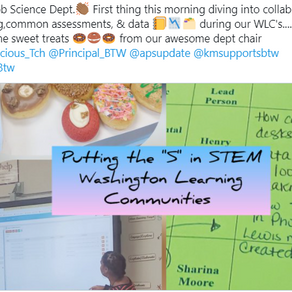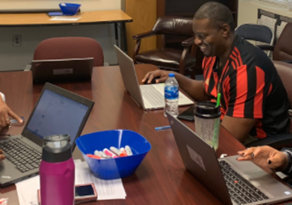


BOOKER T. WASHINGTON HIGH SCHOOL
Standard 6: Professional Development
STEM K12 6: Educators and leaders participate in an ongoing system of STEM-specific professional learning..
Our Story
Recognizing that STEM education requires teachers to consistently improve their practices we try to ensure teachers have access to continuous learning. Many of the guiding principles for STEM teaching such as teacher autonomy, constructivism, explicit/reflective methodology, and 21st century skill building are integrated components of these professional learning opportunities.
These professional learning opportunities come in the form of district support as well as other national or local STEM related training. As a STEM school monthly Washington High School teachers engage in STEM PBL training in which they collaborate interdisciplinary by grade level. As a way of continuous improvement these sessions are not always solely led by our STEM leadership team or coordination.
To truly embrace STEM integration we’ve had the pleasure of working with special guests that are our collaborative partners in teaching and learning to ensure curriculum integration. Education outreach for teachers has come from local people in industry such as Westside Watershed Alliance, Georgia Tech, University of Georgia, State farm, and even other universities such as Tuskegee and Florida State. We have a number of educators that have been trained and credentials for Buffalo case in addition to being a part of a cohort for the Emory STEM Education department, as well as Georgia Techs K12 STEM Connection, and Center for Education Integrating Science, Math, and Computing (CEISMC).
Washington High School has grade level chairs and department chairs that help lead some STEM related training depending on their specific expertise. Because the STEM world is ever changing and evolving we also understand the importance of having STEM planning sessions during the summer. We try to help our teachers build an understanding that one of the most important things they can do, as a STEM teacher, is pay attention to the art of teaching. Washington High School tries to help develop their skills in facilitating (as opposed to dictating). We also look for professional learning opportunities that help teachers embrace digital tools and technology in the classroom. Additionally, several staff members have often served as curriculum writers for the district on STEM integration.
Opportunities for Growth
Because research shows that teachers who work in Professional Learning Communities centered on STEM education increases their own engagement with STEM content and positively impacts how they teach it we as a school are constantly looking for ways to learn STEM pedagogy. We want all of our teachers to feel prepared to teach and facilitate STEM content. This will indirectly enhance our teacher’s inquiry-oriented teaching methods and they will be inclined to pay even more keen attention to students’ reasoning and understanding.

Initiatives/Actions
BTW Faculty takes pride in attending and presenting Professional Development opportunities!
Weekly Professional Learning Sessions by Content (WLC)
APS Instructional Planning Models
Definition of Data Driven Excellence


Monthly STEM PBL PD Sessions
AgSTEM Integration Staff Meeting 12-16-20 @ 1_30PM
AgSTEM Integration Staff Meeting 2-17-21 @ 10AM-12PM
AgSTEM Integration Staff Meeting 3-17-2021
District STEM PL


Professional Development Days

Atlanta Watershed Alliance Darryl Haddock PD with Teachers

Tuskegee Farmers Conference
Trade Talks-Workshop on AG
GIFT provides paid summer STEM internships in industry workplaces and university laboratories for K-12 science, mathematics, and technology teachers. Teachers spend 4 to 7 weeks experiencing first hand how industrial scientists and researchers approach problems, design experiments, interpret data, communicate findings, and develop and implement workplace solutions. GIFT offers teachers "real world" applications of the subjects they teach, allowing them to increase content knowledge and gain practical examples of science, technology, engineering, and mathematics applications for enriched instruction and teaching practices based on evidence-based experiences. Since its founding, GIFT has placed teachers in more than 2000 positions statewide. GIFT is designed to: enhance Fellows' mathematics, science, engineering and/or technology skills, content knowledge, and abilities; foster teaching based on inquiry, problem solving and "real world" relevance; foster an increase in student inquiry skills and positive attitudes toward science and mathematics.
Summer work experience includes but is not limited to: Biology, bioengineering, animal behavior, chemistry, physics, mathematics, earth and atmospheric sciences, engineering and computing, at Georgia Tech, University of Georgia, Emory University, other Georgia research universities, institutes, and some corporations, financial institutions, hospitals, biotechnology firms, manufacturing and power plants, companies engaged in data processing, software applications or economic analysis, market research, medical and environmental analysis research, and many more.
Georgia Intern Fellowships for Teachers







TEALS
Technology Education and Literacy in Schools (TEALS) is a Microsoft Philanthropies program that builds sustainable CS programs in high schools. They focus on serving students excluded from learning CS because of race, gender, and geography. TEALS helps teachers learn to teach CS by pairing them with industry volunteers and proven curricula. The program will equip all students for the future with Computer Science. Provide high school students with equitable access to computer science (CS) education and create a pathway to economic opportunity. Their mission is to help classroom teachers learn to teach CS on their own by pairing them with industry volunteers and proven curricula. Our teachers benefit from TEALS volunteers’ deep CS knowledge and experience, while administrators provide invaluable program support.
The Technology Education and Literacy in Schools (TEALS) Program not only builds teacher capacity but also student interest in computer science with the goal of enabling schools to sustain equitable CS programs on their own. TEALS offers curriculum and support for students of all demographics and backgrounds in computational thinking, problem solving, programming, and computer science concepts that are applicable to any field.


National Science Teachers Association
NSTA conferences offer the latest in science content, teaching strategy, and research to enhance and expand teachers professional growth. We ensue our science teachers are able to take advantage of this unique opportunity to collaborate with other science education leaders. Each year, NSTA hosts a national conference on science education (in the spring), three area conferences (in the fall), and a STEM Forum & Expo




Georgia Tech STEAM Leadership Conference
This conference that several staff members annually attend that has an array of experiences to build and engage K-12 STEAM education leaders. Attending this conference several of our staff members learn and discover solutions and innovative ways of leveraging immersive technology, community partnerships, citizenship, and diversity for the betterment of STEM education.


Georgia Tech STEAM Leadership Conference National Association of ESEA State Program Administrators (formerly the National Title I Association)
The National ESEA Conference is intentionally aimed at coordination among federal education programs under the Elementary and Secondary Education Act (ESEA) and other federal programs. Statistics show that students from low-income households are "three times as likely to be low achievers if they attend high-poverty schools as compared to low-poverty schools." Within this context, Title I was conceived in order to compensate for the considerable educational deprivations associated with child poverty. We have had teachers present successful STEM strategies and inclusion practices for STEM education at such conferences. See pictures below of our own staff participating in these conferences.

STEM Teacher Leader Program sponsored by Honeywell
The National ESEA Conference is intentionally aimed at coordination among federal education programs under the Elementary and Secondary Education Act (ESEA) and other federal programs. Statistics show that students from low-income households are "three times as likely to be low achievers if they attend high-poverty schools as compared to low-poverty schools." Within this context, Title I was conceived in order to compensate for the considerable educational deprivations associated with child poverty. We have had teachers present successful STEM strategies and inclusion practices for STEM education at such conferences. See pictures below of our own staff participating in these conferences.






Honor Code
The <Honor Code> organization through our Washington Cluster partnership with Georgia Tech Center for Education Integrating Science Math and Computing (CEISMC) offered free workshops for our educators in coding and web design. They met monthly to complete and provide a curriculum guide and lesson plans for teachers. Educators learned how to teach computer science fundamentals as a stand-alone course or ways to integrate coding instruction into their various disciplines. At the end of the program our educators showcased their coding skills and coding integration in their classroom.

STEM Innovation Academy Remix
Cobb County STEM combined their Innovation STEM Innovation Academy into an Innovation Academy experience, called the STEM IA Remix. This academy used a hybrid model of professional development this year to support schools looking to cultivate STEM/STEAM practices in their buildings.

Virtual PDs
Rubric-Self-Assessment Evaluation




